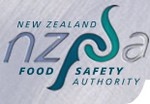New Zealand marine sediments free of botulism
Consumers of seafood harvested from New Zealand harbours and estuaries can be assured that it will not cause botulism following a study by Crop & Food Research scientists.
The study for the New Zealand Food Safety Authority (NZFSA) surveyed the sediments of 16 harbours and found them to be free of the main organism of concern, Clostridium botulinum Type E.
Dr Donald Campbell, NZFSA’s principal advisor public health, says it is welcome news for New Zealanders and the nation's seafood processors.
"There has never been a case of botulism from commercially produced New Zealand seafood probably because the Type E bacteria is absent in our marine sediments," he says. "This finding tells us that the botulism-causing bacteria is sufficiently rare that New Zealand's seafood producers should not have to concern themselves with it."
Dr Campbell says that New Zealand, unlike some northern hemisphere countries, has no need to include Clostridium botulinum as a significant hazard in the HACCP-based Risk Management Programmes of seafood processors unless they are producing canned seafood (HACCP is Hazard Analysis and Critical Control Points).
In some northern hemisphere countries where Type E bacteria are endemic and people have suffered botulism after eating seafood there are codes of practice and regulations to control it. Raising salt levels in products is a common preventative measure.
Crop & Food Research microbiologist Graham Fletcher, who led the research, says there are several types of neurotoxins, produced by different Clostridium species that can cause botulism.
"The Type E bacteria is the only natural marine organism and is of particular concern as it can survive in common fridge temperatures," he says. "Other types associated with foodborne botulism can enter the food-chain from their soil habitats."
"Only one of the 500 samples tested contained any organisms capable of causing botulism and this was Type A which was probably washed in from the land. Type A is not known to grow in the marine environment and will not grow at refrigeration temperatures so does not pose a risk to chilled seafood," says Mr Fletcher.
Mr Fletcher of Processing & Preservation Technologies team at Crop & Food Research develops and recommends safe food handling practices to prevent illnesses caused by micro-organisms.
The full report is available at: http://www.nzfsa.govt.nz/science/research-projects/index.htm.
